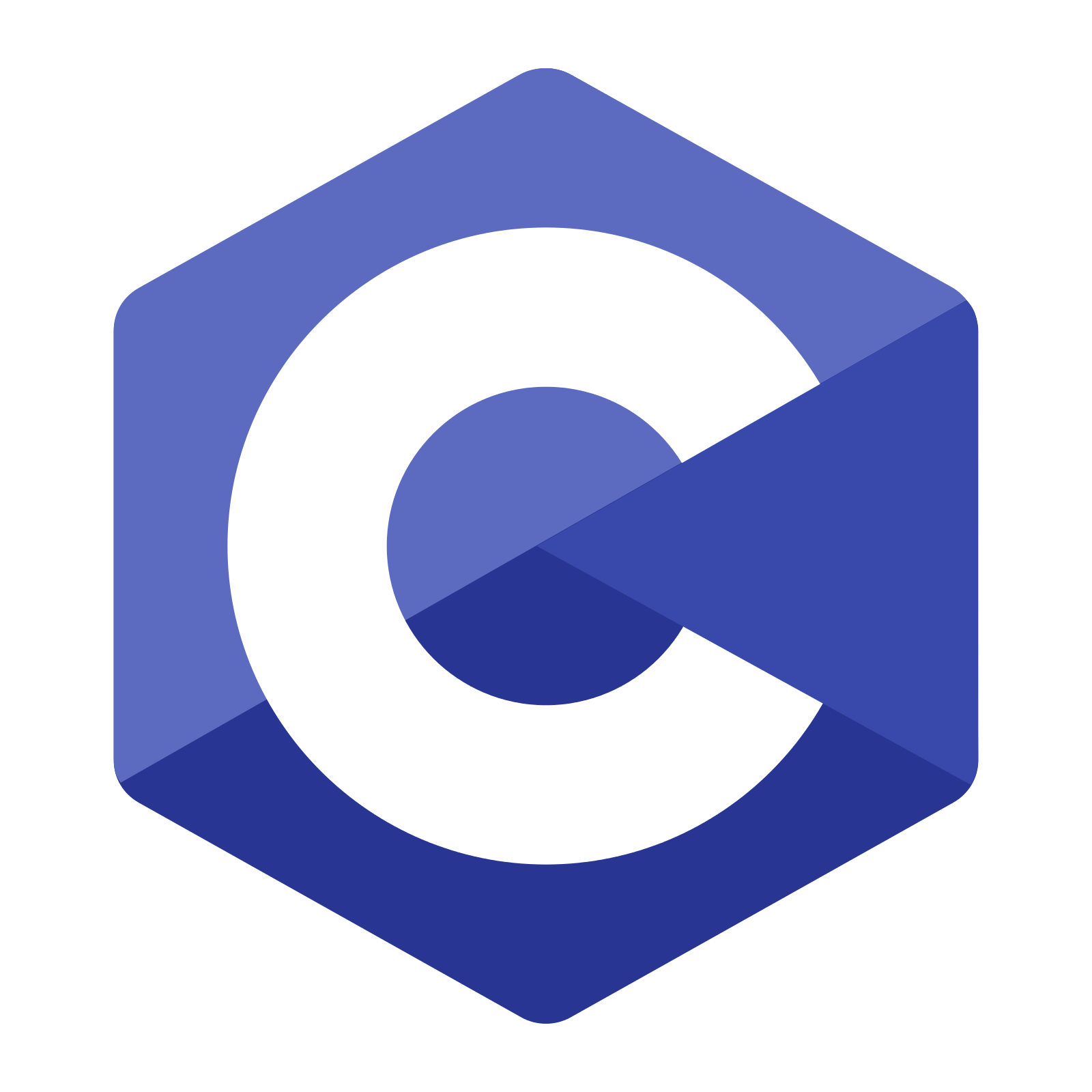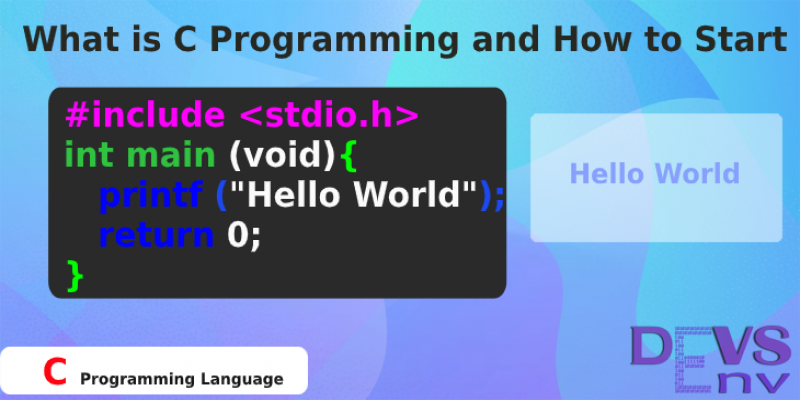
C Programming

What is C Programming and How to Start C Programming
- What is C Programming Language
- Why C Programming Language
- What can I do using this C Programming
- Simple Hello World Application using C Programming
- Getting Started with C Programming:
Welcome to the learning path of one of the most favorite and simplest programming language called “C Programming”.
¶What is C Programming Language
C is a mid level, general purpose, procedural programming language which is used since 44 years. It first appeared in 1972(almost 48 years ago) and still C Programming language rules the world with a strong hand. And in that time, C gains all of the popularity and stability. C Can be developed in cross platform like both windows, mac, linux.
The Creator of this language is Dennis Ritchie. And it was developed at Bell Labs.
¶Why C Programming Language
To answer this question, why is C Programming language for, we have to dive into first why is programming language for.
Programming language is for to do something programmatically or with some scripting.
In a nutshell C is called the Mother language of Programming. C Programming Language is erally a very simple, faster and easy to learn programming language.
Almost every programmer has started there first programming language with C Programming. Here is some reasons why we should use this C Programming language -
- My first reason would be it is the simplest programming language in the competitor of languages.
- It is the basics of all other programing languages. If we clear the concept of C Programming language, we can be the master of any programming language easily.
- C can be easily used for high level programming and low level programming. It is used to develop enterprise applications, games, graphics etc.
- C can easily communicate with Machine Learning and hardware application can easily developed and integrated with C Programming language.
- C Programming language has also a very small runtime. It has bidded all others programming language here in it’s size.
- C is also a very structured programming programming language. That means for a big or complex project, we can make the code structured by making functions.
- C has a strong/rich library to make applications quickly
- If you learn C, you’ve to learn the all of the concepts like loop, if-else, string manipulations. So, your concept would be clear easily.
- C offers dynamic memory allocations. Memory address access and pointer manipulation is the greatest feature of C programming language, which makes it faster and friendly for system development.
- For example and to give a scenario, Windows, Mac, Linux, Android, IOS and everything made almost using C Language.
- C is case sensitive, which means lowercase and uppercase are different and this is important to start in programming learnings.
¶What can I do using this C Programming
C Programming is actually use for system development or server environment development. I can make the following things using this C Programming Language -
- Small embedded system applications.
- Server Applications
- Enterprise Level Applications
- Graphics
- Gaming Applications
- Operating System Development
- Machine Learning
- Hardware Software Development
¶Simple Hello World Application using C Programming
So, let’s see a basic programming in C Programming language and see it’s simpliness.
#include <stdio.h>
int main (void){
printf ("Hello World");
return 0;
}
We’ll learn deeply all of the concepts of C programming language. Just stay with me and stay with this tutorial.
¶Getting Started with C Programming:
¶Setting Up the Development Environment:
¶a. Choose a Compiler:
Select a C compiler compatible with your operating system. Common choices include GCC (GNU Compiler Collection), Microsoft Visual C++, and Clang. And I believe if you’re using the below IDE, then you don’t have to worry about any compiler installations.
¶b. Integrated Development Environment (IDE):
Choose an IDE that suits your preferences. Popular options include Code::Blocks, Visual Studio Code, and Eclipse. Some developers prefer using a simple text editor and the command line for a more minimalistic setup.
¶2. Learning the Basics:
¶a. Variables and Data Types:
Understand the basics of variables and data types in C. Variables store data, and data types define the kind of data a variable can hold (e.g., int, float, char). Get more about Variables and data type.
¶b. Input and Output:
Understand the basics of input and output of C Programming, eg: scanf(), printf(). Get more about Input and Output in C.
¶c. Conditional Statements:
Learn about control flow statements such as if, else, for, while, and switch. These statements control the flow of program execution based on certain conditions. Get more about Conditional Statements.
¶d. Loops
Learn basic about loops in C programming, eg: for loop, while loop, do-while loop. Get more about Loops in C
¶e. Functions:
Explore the concept of functions, which allow you to break down a program into modular and reusable blocks. Functions enhance code organization and readability. Get more about Functions.
¶f. Arrays and Pointers:
Grasp the fundamentals of arrays and pointers, two essential concepts in C. Arrays store collections of data, while pointers store memory addresses. Get more about Arrays and Pointers.
¶g. Structures:
Grasp the fundamentals of structures in C programming. Get more about Structure.
¶3. Practice and Coding Challenges:
¶a. Practice Regularly:
Programming is a skill that improves with practice. Write small programs to reinforce your understanding of concepts and gradually move on to more complex projects.
¶b. Online Coding Platforms:
Engage in coding challenges on platforms like HackerRank, Codeforces, or LeetCode. These platforms offer a variety of problems that can help you enhance your problem-solving skills. Get those solutions also from DevsEnv.
- HackerRank Coding problem solution
- Codeforces Coding problem solution
- LeedtCode Coding problem solution
- BeeCrows Coding problem solution
¶4. Explore Advanced Topics:
¶a. Memory Management:
Learn about dynamic memory allocation and deallocation using functions like malloc() and free(). Understanding memory management is crucial for writing efficient and error-free programs.
¶b. File Handling:
Explore file input/output operations to read and write data to files. This skill is essential for applications that need to store or retrieve information persistently.
¶c. Data Structures and Algorithms:
Delve into data structures such as linked lists, stacks, and queues, and study algorithms to solve problems efficiently. This knowledge is fundamental for software development and coding interviews.
¶5. Build Real-world Projects:
Apply your skills by working on real-world projects. This could be a small utility, a game, or any application that interests you. Building projects allows you to integrate and reinforce your learning.
Getting Started Your First Coding With C Programming
All Tutorials in this playlist
Popular Tutorials
Categories
-
Artificial Intelligence (AI)
11
-
Bash Scripting
1
-
Bootstrap CSS
0
-
C Programming
14
-
C#
0
-
ChatGPT
1
-
Code Editor
2
-
Computer Engineering
3
-
CSS
28
-
Data Structure and Algorithm
18
-
Design Pattern in PHP
2
-
Design Patterns - Clean Code
1
-
E-Book
1
-
Git Commands
1
-
HTML
19
-
Interview Prepration
2
-
Java Programming
0
-
JavaScript
12
-
Laravel PHP Framework
37
-
Mysql
1
-
Node JS
1
-
Online Business
0
-
PHP
28
-
Programming
8
-
Python
12
-
React Js
19
-
React Native
1
-
Redux
2
-
Rust Programming
15
-
SEO - Search Engine Optimization
1
-
Tailwind CSS
1
-
Typescript
10
-
Uncategorized
0
-
Vue JS
1
-
Windows Operating system
1
-
Woocommerce
1
-
WordPress Development
2
Tags
- Artificial Intelligence (AI)
- Bash Scripting
- Business
- C
- C Programming
- C-sharp programming
- C++
- Code Editor
- Computer Engineering
- CSS
- Data Structure and Algorithm
- Database
- Design pattern
- Express JS
- git
- Git Commands
- github
- HTML
- Java
- JavaScript
- Laravel
- Mathematics
- MongoDB
- Mysql
- Node JS
- PHP
- Programming
- Python
- React Js
- Redux
- Rust Programming Language
- SEO
- TypeScript
- Vue JS
- Windows terminal
- Woocommerce
- WordPress
- WordPress Plugin Development
